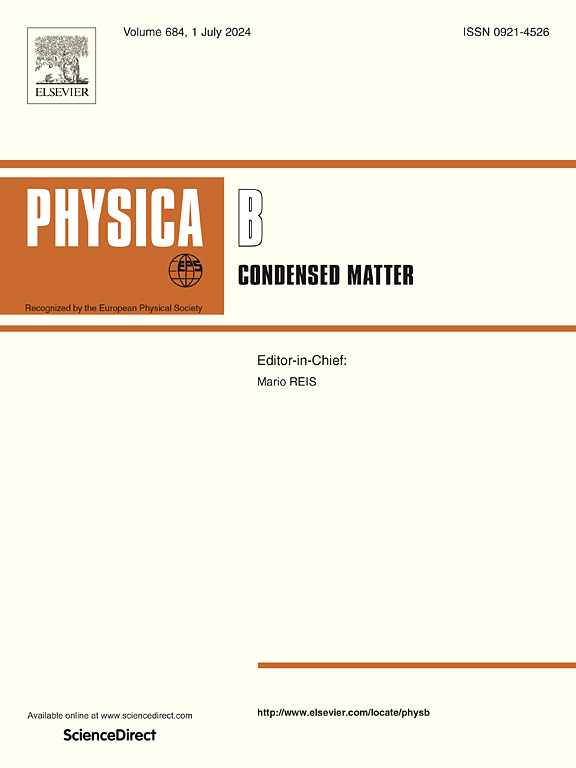化学沉积法在聚四氟乙烯基底上制备的 TiO2-ZnO 纳米复合材料的合成时间对其光电特性的影响
IF 2.8
3区 物理与天体物理
Q2 PHYSICS, CONDENSED MATTER
引用次数: 0
摘要
基于氧化锌的紫外线光电探测器已被应用于环境监测、太空探索和安全光通信等先进领域。在这项工作中,采用化学沉积法在 96 °C 下在聚四氟乙烯基底上合成了 TiO2-ZnO 纳米复合材料,其中包括掺杂了钛的 ZnO 纳米棒,用于紫外光检测器。与分别沉积了 3 小时和 5 小时的纯 ZnO 参考样品相比,该复合材料在结构、光学和电学特性方面均有不同。所制备纳米复合材料的间接带隙为 3.09 eV。所制备的紫外光探测器显示出优异的结果:响应率为 673.667 mA/W,检测率为 5.121 × 108 Jones,外部量子效率为 229.44 %。结果表明,这种纳米复合材料具有在柔性基底上应用光电探测器的潜力。本文章由计算机程序翻译,如有差异,请以英文原文为准。
The role of synthesizing time on the optoelectronic properties of TiO2-ZnO nanocomposite on PTFE substrate fabricated by the chemical bath deposition method
ZnO-based ultraviolet photodetectors have been employed in advanced applications, including environmental monitoring, space exploration, and secured optical communication. In this work, TiO2-ZnO nanocomposite that included Ti-doped ZnO nanorods was synthesized using chemical bath deposition method at 96 °C on PTFE substrates for ultraviolet photodetectors. ZnO nanorods grew for 3 h, followed immediately by the synthesis of TiO2 for 2 h. The characterizations revealed several distinguished structural, optical, and electrical properties compared with reference ZnO-only samples deposited for 3 h and 5 h respectively. The indirect band gap of the produced nanocomposite was 3.09 eV. The fabricated ultraviolet photodetector revealed outstanding results: a responsivity of 673.667 mA/W, a detectivity of 5.121 × 108 Jones, and an external quantum efficiency of 229.44 %. The results showed the potential of the nanocomposite for photodetector applications on flexible substrate.
求助全文
通过发布文献求助,成功后即可免费获取论文全文。
去求助
来源期刊

Physica B-condensed Matter
物理-物理:凝聚态物理
CiteScore
4.90
自引率
7.10%
发文量
703
审稿时长
44 days
期刊介绍:
Physica B: Condensed Matter comprises all condensed matter and material physics that involve theoretical, computational and experimental work.
Papers should contain further developments and a proper discussion on the physics of experimental or theoretical results in one of the following areas:
-Magnetism
-Materials physics
-Nanostructures and nanomaterials
-Optics and optical materials
-Quantum materials
-Semiconductors
-Strongly correlated systems
-Superconductivity
-Surfaces and interfaces
 求助内容:
求助内容: 应助结果提醒方式:
应助结果提醒方式:


